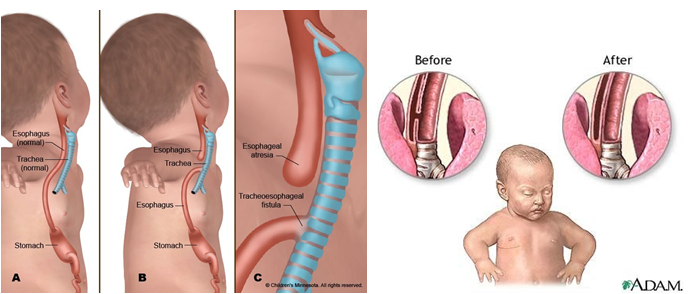A newborn infant with a tracheoesophageal repair is receiving gastrostomy (GT) feedings postoperatively. Which intervention should the practical nurse (PN) implement during the GT feedings?
Burp the infant after every 10 mL of formula and re-feed any volume that is spit up.
Place the infant in the right lateral position to facilitate gastric emptying.
Offer a pacifier during the feedings to satiate the sucking reflex associated with feedings.
Flush the GT with 50 mL water and clamp the GT to prevent leakage.
The Correct Answer is C
During gastrostomy (GT) feedings for a newborn infant with a tracheo-esophageal repair, the practical nurse (PN) should offer a pacifier to satiate the sucking reflex associated with feedings. Sucking is a natural reflex for infants and providing a pacifier during feedings can help satisfy this need and promote comfort. The other interventions listed may also be important to implement during GT feedings, but offering a pacifier to satiate the sucking reflex is the most appropriate intervention in this situation.

Nursing Test Bank
Naxlex Comprehensive Predictor Exams
Related Questions
Correct Answer is A
Explanation
The screening test that should be scheduled for a client who is gravida 4 para 3 at 16-weeks gestation is **Maternal serum alpha-feto protein (MSAFP)**. Second trimester prenatal screening may include several blood tests, called multiple markers. These markers provide information about a woman's risk of having a baby with certain genetic conditions or birth defects. Screening is usually done by taking a sample of the mother's blood between the 15th and 20th weeks of pregnancy (16th to 18th is ideal)².

Correct Answer is D
Explanation
The most important behaviors for the practical nurse (PN) to monitor in this situation are argumentativeness and use of profanity. These behaviors may indicate that the client is becoming agitated and may pose a risk to themselves or others. The PN should closely monitor the client's behavior and take appropriate action to ensure the safety of the client and others on the unit. The other behaviors listed may also be important to monitor, but argumentativeness and use of profanity are the most important in this situation
Whether you are a student looking to ace your exams or a practicing nurse seeking to enhance your expertise , our nursing education contents will empower you with the confidence and competence to make a difference in the lives of patients and become a respected leader in the healthcare field.
Visit Naxlex, invest in your future and unlock endless possibilities with our unparalleled nursing education contents today
Report Wrong Answer on the Current Question
Do you disagree with the answer? If yes, what is your expected answer? Explain.
Kindly be descriptive with the issue you are facing.
